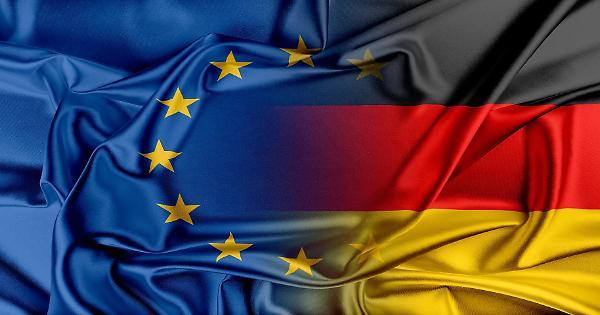Did we understand what is happening in Europe and Germany?

We Italians have understood in which historical political economic caesura we find ourselves? And what happens in Germany? The post by Gianni Bessi, Emilia-Romagna regional councilor and author of "House of tsar – Geopolitics at the time of Putin, Erdogan and Trump" (goWare Editions)
We Italians have understood in which historical political economic caesura we find ourselves? Have we understood what is happening in Europe and particularly in Germany, a country that we 'esteem' but do not 'love'?
Karlsruhe calls, but how does Frankfurt respond? Our journey continues in the most sulphurous and metaphysical human project ever revealed: money and debt.
After the initial stages in Berlin and Brussels for the Recovery Fund agreements with billions – and bottles uncorked in the rooms of the palaces of power in Rome – we could not stop in Karlsruhe to see and hear firsthand what is happening after the sentence of May of the German Constitutional Court. In fact, it is a big mistake to keep minimizing or forgetting. With the pronouncement, beyond the complex legal lexicon of the Bundesverfassungsgericht, it is established that the conduct of the ECB violates the terms of its mandate, offering itself as an instrument of political interference on the European economy; in particular to the detriment of Germany, but of which the countries now known as “frugal” also feel victims, accusing the European Central Bank of benefiting the Mediterranean states of which we belong. The main reason for the accusation concerns the ECB's commitment to buy government bonds of countries in difficulty on the secondary market, and together with the choice to keep interest rates on deposits low (and to be precise negative). This effectively forces institutional savers, including the rich and powerful German pension funds, to expose themselves more to maintain the value of their portfolios, exposing them – this is the sentiment that emerges from the rumors we have gathered – to risks that German policies they would not be responsible at all.
These are not the only voices, however, but only the loudest. In fact, once their clamor has been overcome, we are attracted by more whispered reflections, which instead greet favorably the confidence shown towards the Mediterranean countries of the eurozone. Someone even goes so far as to say that it is good for the unity of Europe that the European Union was able to learn from the mistakes made during the 2008 crisis. On that occasion, a response to a crisis that we remember caused from Anglo-Saxon ultraliberalism, with ultra-liberal budgetary rigor measures and which was imposed by a leadership of a country that was cataloged as characterized by a "continental welfare": Germany.
Today a new attitude compared to that adopted towards Greece represents an important response and a real evolution in the continental geopolitical panorama. The fact, as Filippo Onoranti, my 'traveling companion' in these analyzes of the current European Zeitgeist reminds me, that he comes from Berlin , expresses that historical, political and institutional phenomenon that is German syncretism, and that from the postwar period to reunification , nowadays it manages to temper and redirect political, financial, economic and social upheavals of the German people, translating the idea of a German nation from power into action. Everything solved? Not exactly.
However, the Court's ruling shows how German syncretism is still urged to seek the right balance, the concrete solidity and the necessary cohesion on which the efforts and the policy of the four decades of the Merkel government are concentrated. The Chancellor today can count on the support from Brussels of her friend and party partner Ursula Gertrud von der Leyen, who das Mädchen imposed on the Presidency of the European Commission, with which she is sharing the double European helm in this phase of the German presidency. . From Frankfurt the support comes from the partner / rival France with the President of the ECB Christine Madeleine Odette Lagarde, who knows how to juggle with her usual elegance between finance and international politics and who has reaffirmed in four interviews simultaneously in four of the most important European newspapers such as the ECB will continue the purchases without batting an eye and relaunching that the covid will have to review the Stability Pact. Despite this barrage, the situation still has some flaws. And perhaps the Karlsruhe sentence and the forces that will use it have not been well understood.
Emblematic in this sense is the position of Rainer Zitelmann, historian economist and German sociologist, who never misses an opportunity as happened in an interview with Corriere della Sera to reiterate the fundamentals of German capitalism (and of Ordoliberalism): "the subsidies from 'Northern Europe to southern Europe will not help anyone ”. The economist goes on to criticize central banks for doing the purest form of planned economy that can be seen. Interest rates are the price of money. And arguing that if interest rates are abolished, this is tantamount to abolishing the market. It fully embodies the most extreme phalanx of ultraliberalism which sees central bank policies as the greatest threat facing capitalism. This position is often used as an antithesis to the view that most European politicians support, and which sees the heavy intervention of the centralized government among the reasons for China's success, instead considering it only an excuse to justify a greater intervention of the state also in Europe. . And could not miss the thrust for the beloved but not esteemed Italians prophesying that Italy needs more capitalism and a state that gives rules and reforms. How do you tell us we need a Gerhard Fritz Kurt Schröder?
Here Karlsruhe, to you Frankfurt.
This is a machine translation from Italian language of a post published on Start Magazine at the URL https://www.startmag.it/mondo/europa-germania-cosa-succede/ on Sun, 30 Aug 2020 05:42:25 +0000.
